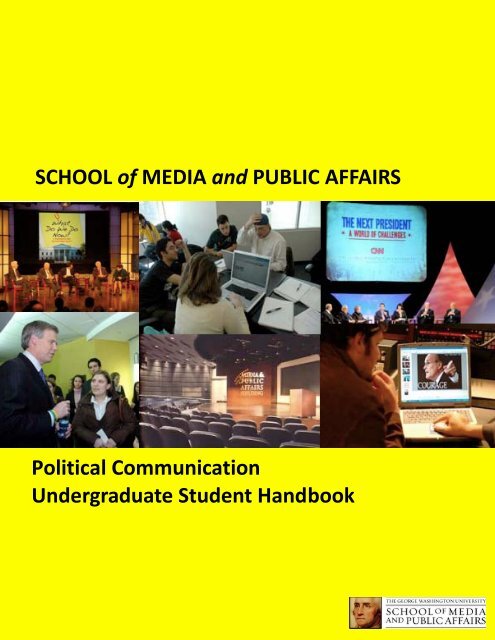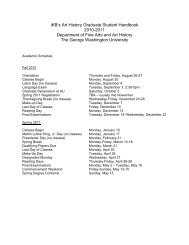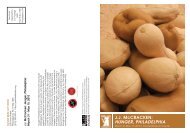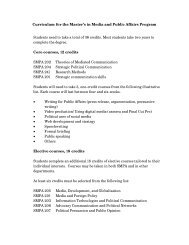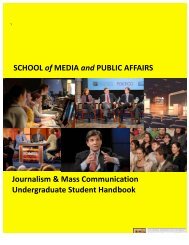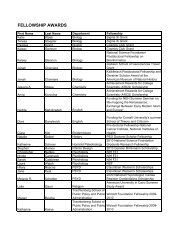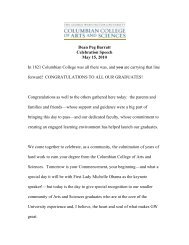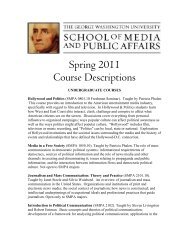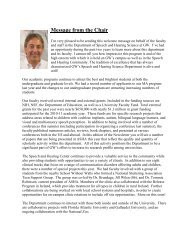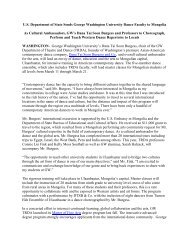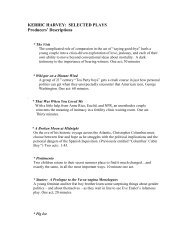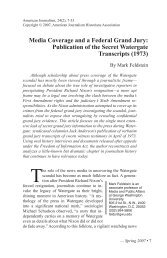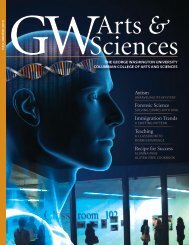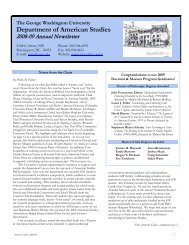JMC Student Handbook 2009-2010.pub - Columbian College of Arts ...
JMC Student Handbook 2009-2010.pub - Columbian College of Arts ...
JMC Student Handbook 2009-2010.pub - Columbian College of Arts ...
Create successful ePaper yourself
Turn your PDF publications into a flip-book with our unique Google optimized e-Paper software.
SCHOOL <strong>of</strong> MEDIA and PUBLIC AFFAIRS<br />
Political Communication<br />
Undergraduate <strong>Student</strong> <strong>Handbook</strong>
Program Overview<br />
T<br />
he Political Communication Major is unique — a combination <strong>of</strong><br />
communication, journalism and political science. It's the only one<br />
available in the heart <strong>of</strong> the nation's capital, literally just blocks from<br />
the White House. Political communication focuses on the creation,<br />
dissemination, processing and effects <strong>of</strong> information as a political<br />
resource by individuals, organizations or governments.<br />
If you choose this major, you will analyze media coverage, learn how to frame messages and communicate<br />
strategically, and discuss the media's role domestic and international relations. You will study how political<br />
actors and institutions influence media coverage and the effects <strong>of</strong> that coverage on public opinion, policy<br />
and social life. Our D.C. location affords you the opportunity to take advantage <strong>of</strong> limitless internships and<br />
other extracurricular activities.<br />
Upon graduation, you will become part <strong>of</strong> an accomplished network <strong>of</strong> Political Communication alumni<br />
working in government, political consulting, advocacy,<br />
campaign management, public diplomacy, corporate public<br />
affairs, public relations, and new media.<br />
About SMPA<br />
The School <strong>of</strong> Media and Public Affairs is a<br />
recognized center for teaching and research in<br />
political communication, journalism, global media<br />
studies, and documentary filmmaking. Our faculty<br />
is composed <strong>of</strong> accomplished scholars, award<br />
winning journalists, and dedicated educators. Our<br />
mission is to explore how ideas and information<br />
are communicated and how the media influence<br />
policy and politics in a democracy.<br />
Our location in the nation's capital—just four<br />
blocks from the White House and three blocks<br />
from the State Department—provides our<br />
students unequalled access and opportunity. We<br />
bring together some <strong>of</strong> the most compelling and<br />
influential voices in media, politics and public<br />
affairs. <strong>Student</strong>s have access to hundreds <strong>of</strong> jobs<br />
and internships in government, news and<br />
advocacy organizations. Our television studio,<br />
state <strong>of</strong> the art video equipment, editing suites,<br />
and digital media expertise provide exceptional<br />
opportunities to learn and produce in a hands-on<br />
environment.<br />
The approach to everything we do at SMPA—<br />
research, teaching, and production—stems from<br />
the belief that theory and practice are inseparable.<br />
Our students study with leading scholars and<br />
award-winning journalists who bring real world<br />
experience to the classroom. Our undergraduate<br />
and graduate programs combine elements <strong>of</strong><br />
strategic communication, journalism, and political<br />
communication, preparing our students for<br />
distinguished careers in new and traditional media<br />
organizations, government, politics, and business.<br />
This handbook will provide specific information about the Political Communication major and help guide you through<br />
your degree.<br />
For more information, please visit our website:<br />
http://smpa.gwu.edu<br />
School <strong>of</strong> Media and Public Affairs <strong>Columbian</strong> <strong>College</strong> <strong>of</strong> <strong>Arts</strong> and Sciences<br />
The George Washington University 801 22nd St. NW, Phillips Hall<br />
805 21st St., NW, Suite 400 Washington DC 20052<br />
Washington, DC, 20052 Phone: (202) 994-6130<br />
Phone: (202) 994-6227 Fax: (202) 994-0854<br />
Fax: (202) 994-580
Application Process<br />
T<br />
he Political Communication major is a selective<br />
major. <strong>Student</strong>s may apply for direct admission<br />
as freshmen or in the sophomore year.<br />
Non-GW students applying as a<br />
freshman<br />
High school students may apply to study in SMPA<br />
by indicating their wishes on the general<br />
application to the university. Although students<br />
will generally not begin taking SMPA courses until<br />
they are sophomores, applicants learn about<br />
whether they have been admitted to SMPA at the<br />
same they learn about admission to the <strong>Columbian</strong><br />
<strong>College</strong> <strong>of</strong> <strong>Arts</strong> and Sciences at GW.<br />
GW students applying for a Political<br />
Communication major<br />
Once on the campus, any GW sophomore already<br />
in the <strong>Columbian</strong> <strong>College</strong> <strong>of</strong> <strong>Arts</strong> and Sciences may<br />
apply directly to SMPA by submitting an essay, an<br />
application form, a declaration form, and a<br />
transcript to the school. Deadlines for<br />
applications usually occur about the fourth<br />
week <strong>of</strong> the fall and spring semesters.<br />
<strong>Student</strong>s who were turned down as<br />
freshmen are free to apply again and will<br />
have equal standing with other applicants.<br />
A sophomore who is not accepted may<br />
apply a second time.<br />
Selection is made through a competitive<br />
application process. <strong>Student</strong>s are required<br />
to have an overall 3.0 GPA for<br />
consideration. Meeting the minimum<br />
standards does not guarantee admission.<br />
Overall GPA, performance in selected<br />
<strong>Columbian</strong> <strong>College</strong> <strong>of</strong> <strong>Arts</strong> and Sciences<br />
courses, demonstrated interest in the field<br />
<strong>of</strong> political communication, and a short<br />
essay are the major factors used in judging<br />
applications. The application information<br />
can be found here:<br />
smpa.gwu.edu/admissions/undergraduate
Advising<br />
I<br />
n the freshman year, each student is assigned a <strong>Columbian</strong> <strong>College</strong> <strong>of</strong> <strong>Arts</strong> and Sciences academic<br />
advisor. The academic advisor will work with students from matriculation to graduation to help<br />
them navigate the general GW requirements for the degree. See the CCAS advising website for more<br />
information: http://columbian.gwu.edu/undergraduate/advising<br />
In the sophomore year, students are assigned a faculty advisor in the<br />
School <strong>of</strong> Media and Public Affairs. Faculty advisors assist with SMPA<br />
major requirements, provide mentoring, and work with students as<br />
they consider post-graduate plans.<br />
The best advising happens when faculty and students work together<br />
to chart an appropriate course through the requirements <strong>of</strong> the<br />
major. <strong>Student</strong>s are encouraged to visit with their faculty advisor once<br />
a semester.<br />
Although the faculty advisors make every effort to provide timely<br />
and accurate information through advising, the ultimate<br />
responsibility for assuring steady progress toward the degree rests<br />
with the student.<br />
<strong>Student</strong>s should be aware <strong>of</strong> two benchmark points in their undergraduate careers which require that<br />
they initiate a review <strong>of</strong> their progress:<br />
In the junior year, the academic advisor in the <strong>Columbian</strong> <strong>College</strong> prepares a "Balance Sheet"<br />
summarizing the remaining requirements a student must meet to graduate. It provides a good<br />
roadmap for a student’s remaining time on campus. A student should request a balance sheet if they<br />
have not received one by the end <strong>of</strong> the junior year.<br />
At the beginning <strong>of</strong> the senior year, a student should file an "Application to Graduate." This initiates an<br />
additional review <strong>of</strong> the record, as well as assuring that the student’s name will appear on a variety <strong>of</strong><br />
lists related to graduation activities. The necessary form is available from the <strong>Columbian</strong> <strong>College</strong><br />
Advising Center in Phillips 107.<br />
Career Advising & Placement Services<br />
T<br />
he GW Career Center <strong>of</strong>fers additional career advising and placement services to students at every<br />
stage <strong>of</strong> their SMPA experience. <strong>Student</strong>s can receive assistance in finding -time a part job<br />
(including Federal Work Study), internships, co-ops, and full-time jobs. The career center’s “FREE” (Find<br />
the Right Experience & Employment) program <strong>of</strong>fers students comprehensive career guidance<br />
throughout their four years at GW. <strong>Student</strong>s are also encouraged to consult with their faculty advisors,<br />
who may also know <strong>of</strong> internship or employment opportunities.<br />
Email: Phone:<br />
Main: gwcarctr@gwu.edu Main: 202.994.6495<br />
Federal Work Study: fws@gwu.edu Career Resource Room: 202.994.8629<br />
Cooperative Education: gwcoop@gwu.edu <strong>Student</strong> Employment: 202.994.8046<br />
On Campus Recruiting/Employer Relations: ocr@gwu.edu Employer Relations: 202.994.8633
Curriculum<br />
The following is a checklist <strong>of</strong> courses needed to fulfill the requirements <strong>of</strong> the PCM major. Directly admitted<br />
freshmen should concentrate on CCAS requirements during the freshman year.<br />
CCAS Co-Requisite Courses - These courses fulfill GCR requirements.<br />
___ AMSD101/HIST71 Introduction to American Studies/Introduction to American History<br />
___ AMSTD102/HIST72 Introduction to American Studies/Introduction to American History<br />
___ PSC2 Introduction to American Politics and Government<br />
___ PSC1/3 Introduction to Comparative Politics or Introduction to International Politics<br />
___ STAT53 Introduction to Statistics in Social Sciences<br />
SMPA Required Core Courses:<br />
___ SMPA 51 Research Methods<br />
___ SMPA 101 Journalism and Mass Communication Theory and Practice<br />
___ SMPA 102 Introduction to Political Communication<br />
___ SMPA 110 Introduction to News Writing and Reporting<br />
___ SMPA 112 Introduction to Digital Media<br />
___ SMPA 199 Senior Seminar<br />
Major Specific Required Courses:<br />
___SMPA120 or PSC 120 Public Opinion<br />
Two 100 level Political Science Courses<br />
___PSC____<br />
___PSC____
Electives (Choose 7 From the following list):<br />
___ SMPA 141 Campaign Rpt<br />
___ SMPA 145 Editorial & Persuasive<br />
Writing<br />
___ SMPA 150 Public Diplomacy<br />
___ SMPA 151 Pub Affs & Govt Info<br />
___ SMPA 152 Principles <strong>of</strong> PR<br />
___ SMPA 153 Strategic Pol Comm<br />
___ SMPA 154 Pol Campaign Comm<br />
___ SMPA 155 Camp Advertising<br />
___ SMPA 156 Political Debate<br />
___ SMPA 157 Pol Speech Writing<br />
___ SMPA 158 Strategic Practicum<br />
___ SMPA 159 Language & Politics<br />
___ SMPA 160 Race, Media & Politics<br />
___ SMPA 161 Campaigns & Elections<br />
___ SMPA 162 Info, Media, Nat Security<br />
For descriptions <strong>of</strong> all courses, see the University Bulletin at:<br />
http://www.gwu.edu/~bulletin/index.html<br />
___ SMPA 163 Media Bias, Power,<br />
Democracy<br />
___ SMPA 169 International Comm<br />
___ SMPA 170 Comparative Media Sys<br />
___ SMPA 171 Media and the<br />
Developing World<br />
___ SMPA 172 Med & Foreign Policy<br />
___ SMPA 173 Media Law<br />
___ SMPA 178 Media Effects<br />
___ SMPA 194 Selected Topics 1<br />
___ SMPA 194 Selected Topics 2<br />
___ SMPA 197 Field Exp/Internship 1<br />
___ SMPA 197 Field Exp/Internship 2<br />
___ SMPA 198 Honors Seminar<br />
___Other/Special<br />
For descriptions <strong>of</strong> all SMPA courses in the current semester, see the SMPA website at:<br />
http://smpa.gwu.edu/academics/currentstudents/
Internships<br />
Considerable importance is attached to internship activities in the<br />
Political Communication major both because <strong>of</strong> the ready access to<br />
opportunities in the Washington area, and because the basic<br />
philosophy <strong>of</strong> the major emphasizes the interaction <strong>of</strong> theory and<br />
practice.<br />
<strong>Student</strong>s find their own internships, but SMPA is determined to<br />
make every one a worthwhile preview <strong>of</strong> the pr<strong>of</strong>essional work life<br />
to come. And sometimes, internships turn into full-time jobs at<br />
places like the NBC Today Show, the prominent political consulting<br />
firm GMMB, Fenn Communications, Edelman, National Geographic or the Washington Post.<br />
SMPA internships are open to juniors and seniors majoring in political communication. A weekly<br />
newsletter emailed to every SMPA student contains postings about dozens <strong>of</strong> internships available<br />
year round. In addition, faculty members may be able to assist in arranging internships through<br />
their many pr<strong>of</strong>essional contacts in the Washington area.<br />
<strong>Student</strong>s majoring in Political Communication can be approved for internships in news<br />
organizations, advocacy groups, legislative <strong>of</strong>fices, the White House and executive branch, campaign<br />
organizations, or public relations firms. The internship must be for three credit hours, and be 15<br />
hours <strong>of</strong> work per week. The recommended weekly maximum work hours for a PCM internship is 15<br />
hours. For further requirements and information, see the SMPA website:<br />
http://smpa.gwu.edu/academics/internships/<br />
Special honors in the major<br />
<strong>Student</strong>s with a 3.7 GPA in all courses completed at GW and in all courses required for the major<br />
may declare for Special Honors in political communication at the beginning <strong>of</strong> the senior year.<br />
<strong>Student</strong>s take SMPA 199 (Senior Seminar) in the first semester <strong>of</strong> the senior year and SMPA 198<br />
(Honors Research Seminar) in the second semester. To achieve Special Honors, the student must<br />
maintain the required GPA and present a successful oral defense <strong>of</strong> a research paper prepared for<br />
the Honors Research Seminar before a committee that<br />
includes the seminar instructor and two other faculty<br />
members nominated by the student and approved by the<br />
seminar instructor.
Dual Degree Programs<br />
SMPA undergraduate students can take advantage <strong>of</strong> two programs designed to help them achieve a<br />
Bachelor’s Degree and a Master’s Degree while saving time and money. SMPA’s B.A. students can enroll in<br />
a Dual Degree Program to pursue additionally either a Master <strong>of</strong> <strong>Arts</strong> in Media and Public Affairs with a<br />
concentration in Strategic Political Communication from SMPA, or a Master <strong>of</strong> <strong>Arts</strong> in Pr<strong>of</strong>essional Studies<br />
with a concentration in Political Management from the Graduate School <strong>of</strong> Political Management.<br />
Interested majors should apply three semesters before graduation, typically the second semester <strong>of</strong> their<br />
junior year.<br />
For more information, see the SMPA website: http://smpa.gwu.edu/academics/dualdegree/<br />
Academic Integrity<br />
The faculty and students <strong>of</strong> the Political Communication major do not tolerate academic dishonesty in any<br />
form, and university policies regarding these matters will be rigorously enforced.<br />
http://www.gwu.edu/~ntegrity/code.html<br />
University Resources<br />
Here is a list <strong>of</strong> additional resources available at GW.<br />
GW Writing Center: http://www.gwu.edu/~gwriter/<br />
GW Counseling Center: http://gwired.gwu.edu/counsel<br />
GW Disability Support Services: http://gwired.gwu.edu/dss<br />
GW Career Center: http://gwired.gwu.edu/career/
SMPA Communications<br />
The SMPA Communications and Marketing <strong>of</strong>fice is responsible for all school internal and external<br />
communications, and for updating the many ways that SMPA keeps in touch with current students and<br />
alumni. All current students automatically receive a weekly e-newsletter with internships, events, and<br />
other news.<br />
Here’s a list <strong>of</strong> other ways to keep in touch with SMPA:<br />
SMPA Events Calendar: http://smpa.gwu.edu/news/calendar/<br />
SMPA on Twitter: @SMPAGWU<br />
SMPA on Facebook: http://www.facebook.com/SMPAGWU<br />
SMPA on Youtube: http://www.youtube.com/user/GWUSMPA<br />
SMPA on Flickr: http://www.flickr.com/photos/smpagwu/sets/<br />
SMPA Blog: http://blogs.columbian.gwu.edu/smpa/


